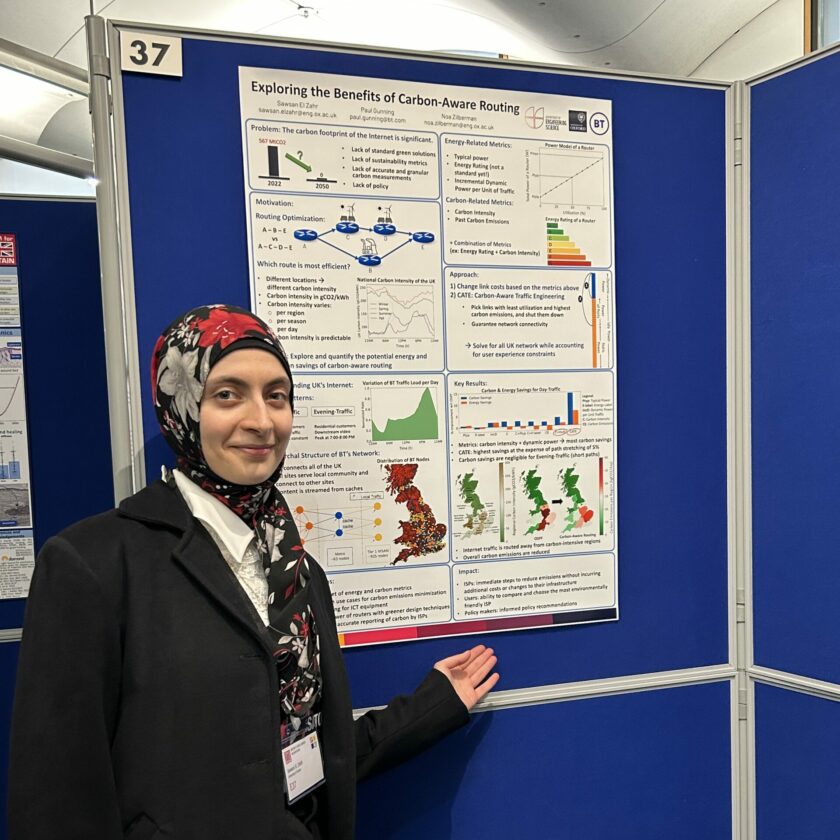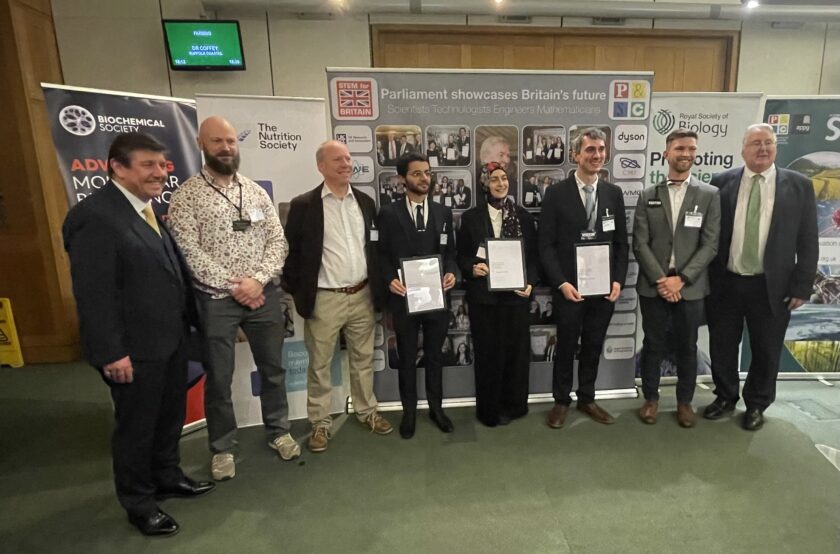Huge congratulations to our DPhil student and Oxford Qatar Thatcher Scholar Sawsan El-Zahr on winning first place in the Dyson Sustainability Award at this year’s STEM for Britain competition.

Sawsan presenting her poster at STEM for Britain, Monday 4th March 2024
STEM for Britain invites the UK’s foremost early-career researchers to present and discuss their research with Members from both Houses of Parliament. The event offers entrants a rare opportunity to engage in dialogue with policy-makers and gain an understanding of how their research could translate into collaborative projects and policy.
Sawsan’s research focuses on reducing the carbon footprint of the internet, examining how carbon-aware routing strategies can drastically reduce emissions. She first combined routing algorithms, power modelling and carbon-awareness to explore the differences between energy-efficiency and carbon-efficiency of energy routing. From these observations, Sawsan was able to design a Carbon-Aware Traffic Engineering solution that will enable Internet Service Providers to reroute their traffic flows efficiently through greener paths and disable under-utilised links in a given network without endangering overall resilience. This project offers enormous potential benefits to both internet service providers and end-users: ISPs will be able to reduce emissions without incurring additional costs or changes to their infrastructure, while users will be able to compare and select the most environmentally friendly ISP. Policy-makers can also potentially make more informed policy recommendations on ‘greening’ the internet using Sawsan’s research.
Judging for the competition took place on the afternoon of Monday 4th March 2024 at the Houses of Parliament, with Sawsan speaking to Members about her poster during a 2-hour period. Having received first prize in the Dyson Sustainability Award, Sawsan will now be considered for the highly prestigious Westminster Medal, alongside the winners in the other five categories.
Speaking of her achievement, Sawsan said “I was so honoured to participate in STEM for Britain and win the first prize, and I hope that the discussions we had about sustainability can impact policy making.”
Sawsan’s supervisor, our Tutorial Fellow in Engineering, Prof Noa Zilberman, added: “Making the Internet sustainable is essential, especially with the growing use of AI, cloud computing and video streaming. Sawsan’s research is an important step towards a more sustainable Internet, and I am excited to see her work recognised by such an esteemed award.”
Sawsan is currently studying for her DPhil at Somerville as an Oxford Qatar Thatcher Scholar.* Speaking about Sawsan’s achievement, Director of the Margaret Thatcher Scholarship Trust, Jessica Mannix, commented, “The Margaret Thatcher Scholarship Trust and the Thatcher Scholarship Programme were established to support brilliant scholars and researchers who would be leaders in their field and a force for good in the world. Sawsan’s research and achievement in winning this award are a clear fulfilment of that vision.”
Sawsan first shared her research in late 2023, when it received the Applied Networking Research Prize 2024 and was commended as some of the most exciting research in the field by the Internet Research Task Force (IRTF).
Congratulations, again, on this phenomenal achievement, Sawsan!
* The Qatar Thatcher Scholarships are most generously funded through a benefaction from the Qatar Fund for Development.

Sawsan alongside her fellow winners and competition judges in the Houses of Parliament, Monday 4th March 2024